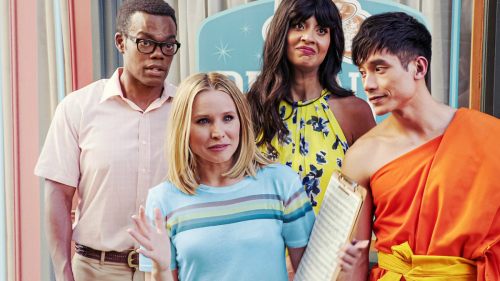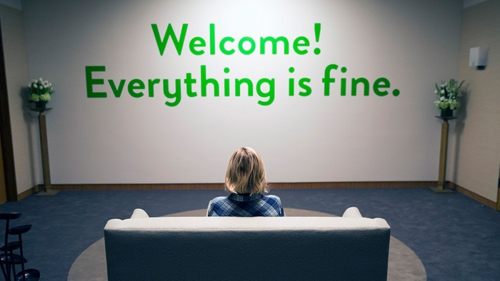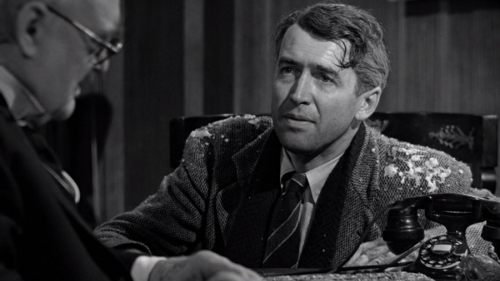THE GOOD PLACE Season One Review: Heart And Humor In Heaven
NBC's The Good Place aired its thirteenth episode in January, ending what had to be one of the most unusual first seasons of any network sitcom in recent memory. What a deeply weird show this is. For starters, all of the present day action takes place in heaven. The production design is incredible, the set jolly and colorful, offering a model train perfection that is only marred by the occasional giant flying shrimp or cosmic sinkhole.
Wait, what? I should probably back up. Kristen Bell plays Eleanor Shellstrop, a recent inductee of The Good Place, the non-denominational (we learn that every religion got it "about 5% right") afterlife saved only for the tiniest percentage of the very best humans. There are countless Good Places, but this is Eleanor's, along with a few other folks'. A population of a couple hundred "live" in this Good Place, all overseen by Michael (Ted Danson), the architect of this particular version of heaven. Here, Eleanor is given her dream house and meets her soulmate, Chidi (William Jackson Harper), a moral philosophy professor when he was on Earth. She meets her neighbors, Tahani, a beautiful philanthropist played by Jameela Jamil, and Tahani's soulmate Jianyu Li (Manny Jacinto), a Buddhist monk who has taken a vow of silence that lasts well beyond his death.
But here's the thing. Eleanor doesn't belong in The Good Place. There was another Eleanor Shellstrop, an attorney who devoted her life to rescuing innocent people from the death penalty and hunger-striking in opposition of human trafficking, but this Eleanor Shellstrop was a telemarketer who sold bogus meds to the infirmed elderly and spent most of her free time partying and treating people like crap. Eleanor's entrance into The Good Place was a mix-up, a mistake that has thrown off a very delicate balance, and the utopia starts going haywire in some very creative and visually interesting ways. (Giant flying shrimp!) Rather than 'fess up and be sent to The Bad Place, Eleanor enlists the help of Chidi to teach her moral philosophy in the hopes of earning her way into heaven, trying to become a good person so late in life that it's actually the afterlife.
The Good Place is created by Mike Schur, the creator of Parks and Recreation and Brooklyn Nine-Nine, and the hat trick has firmly established him as an auteur of kindness. So few comedies can boast the warm-hearted hilarity of a Schur joint. These shows will make you guffaw many times in an episode, but never (or rarely - sorry Jerry, Hitchcock and Jason) at the expense of a character's dignity. There is so much good in The Good Place, the greatest share of which is thanks to Chidi. Harper gives such a lovely, awkward pathos to Eleanor's hapless keeper, a man who devoted his life to doing the right thing and deserves to take a load off in heaven, but is instead saddled with transforming a selfish, foul-mouthed misanthrope into a bastion of principles. He's forced to lie to protect the promise he made Eleanor, and the ethical implications of that dilemma have left him with an eternal stomachache. Still, he's kind, and funny, and he really is capable of influencing Eleanor to be good.
Kristen Bell has never been better than in The Good Place, and I say that as a career-long Kristen Bell admirer and an impassioned fan of Veronica Mars. She is so funny, so snarky and short-tempered and obnoxious. You can't curse in The Good Place, but that doesn't stop Eleanor from trying, which gives Bell dozens of opportunities to spit out such head-scratchers as "Holy motherforking shirtballs" with utter conviction. But it's Eleanor's attempts at self-improvement that show Bell in her best light - she's insecure around all of these people who are so much better than she, and she's terrified that if she tries to become good she'll fail. She's vulnerable and persnickety, but she truly cares about and admires Chidi. Their friendship, and her love for Chidi - perhaps the first selfless emotion of Eleanor's existence - are really lovely, a dynamic in which you cannot help but be invested. In the finale, Eleanor tells Chidi, "I was dropped in a cave, and you were my flashlight," and her earnest, ardent desire to make him understand what he means to her is something special.
Everyone around them is as great. Danson's cool and quirky here, terrifically funny, a perky avuncular type that he's rarely played before. He marvels at humanity, this charming foible he finds endlessly fascinating, and Michael's insights about humans are spot-on. He's obsessed with frozen yogurt, for instance: "There's something very human about taking something great and ruining it just a little so you can have more of it."
But the coolest thing about The Good Place is how culturally diverse its cast is. After all, heaven's unlikely to be filled with nothing but white Americans, regardless of what white Americans might think about it. Bell and Danson are two of the only white people in the primary cast, and this cast is so good. The Good Place is Jamil's first on-screen credit, and it's hard to believe, as Tahani is stunning and hilarious. She has an amazing presence, and she will constantly crack you up with her lofty, good-natured self-regard. I don't want to talk too much about Jianyu, as there's an element to his character that could be spoiled, but Jacinto's performance is bizarre and wonderful. And then there's D'Arcy Carden, who plays Janet, The Good Place's informational mainframe. She's so, so funny, this cheerful, robotic weirdo with whom you'll fall in love.
Well, here's the other coolest thing: The Good Place is a network sitcom about morality, about philosophy. Through Chidi's lessons to Eleanor, each episode is a mini class in very basic philosophical concepts. While none of what we see here will be new to anyone who's read a little Aristotle or Kant (or, in my case, Jostein Gaarder's beautiful novel Sophie's World), The Good Place really gets interesting when it turns its collective nose up at the concept of moral absolutism. Over and over again, Eleanor bemoans the lack of a "medium place," a place for people like her, people who didn't devote their lives to saving orphans or whatever, but who also never killed anyone or got a vanity plate. And the very idea that we can continue to improve ourselves after we die is an appealing one, isn't it?
There's nothing really like The Good Place, a half-hour comedy on NBC that deals with moral philosophy and the afterlife while making us laugh and fall in love with its characters. It's great television, made even greater in the finale when everything is turned on its head, leaving us breathless for a second season (one that's already confirmed, thank goodness). It's smart and funny and profoundly kind, a sitcom that will make you want to be a better person, and may even give you a few basic tools to get there.
You can watch the full season here.



